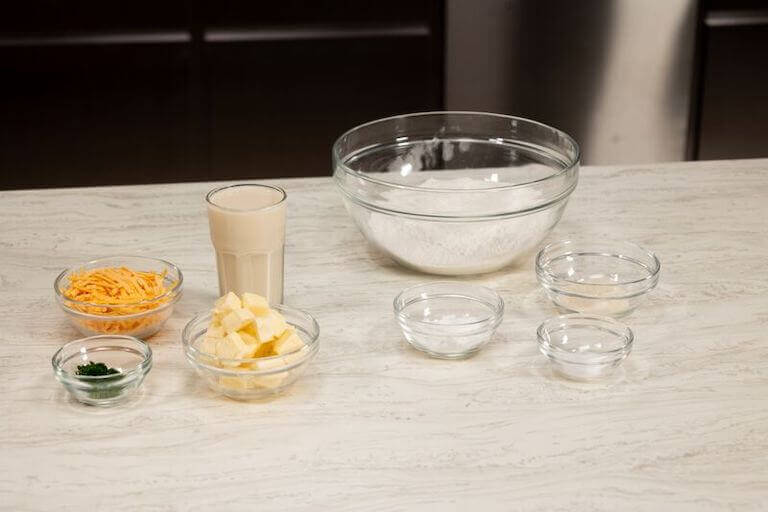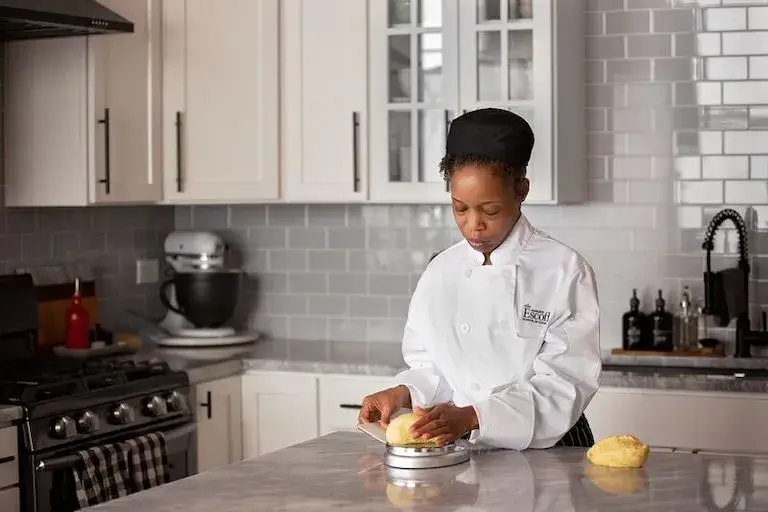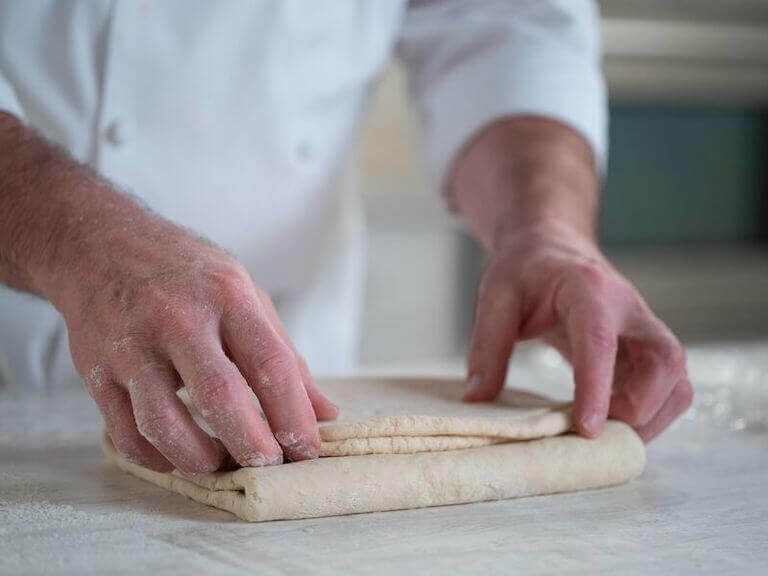Listen to This Article:
Maybe you dream of ditching your corporate job to become a wedding cake designer. Or perhaps you’re looking to open a bakery so you can share your coveted family recipes with the world. Regardless of what your goals are in the baking world, having a strong foundation of skills can help you on your path to success.
However, it takes more than just incredible baking skills to set you apart in the culinary world. Successful bakers also develop a variety of essential qualities that go beyond the technical aspects of baking.
Whether you’re working with yeasted dough or laminated pastry, these principles can help you churn out delicious goods and be in a better position to build a successful baking career.
1. Understanding of Mise en Place
The most successful bakers in the industry usually know that the process of baking requires careful timing and organization, so having your baking station prepared with everything you’ll need – including all the tools and pre-measured ingredients – is vital. In the industry, this is called “mise en place.”
Let’s say you’re getting ready to mix up a batch of cheddar and chive biscuits. You begin by cutting chilled butter into the dry ingredients to form that desired crumbly consistency. However, just as things are looking good, you have to stop for fifteen minutes to chop the chives and shred the cheese. During that time, your butter softens, compromising the biscuits’ flaky texture.
Now let’s see what it looks like to make those same biscuits using mise en place. Your station would already be set up with everything you need before you started following the recipe. For example, the butter would already be chilled and cubed, the chives finely chopped, and the cheese shredded and ready to go. All of the tools you needed including the pastry cutter and mixing bowl would be within reach. This preparation allows you to move more seamlessly through the recipe without delays so the butter stays cold and your biscuits bake up flaky just like you wanted.
While it may seem like a simple concept, organizing your ingredients and workspace ahead of time is often the difference between success and failure in the kitchen.

Mise en place helps ensure that you have the ingredients and tools needed for your recipe within reach when you need them.
2. Clear Team Communication
Along with being proficient at working with yeasted doughs and piping straight lines, communication is a skill that great bakers usually possess. Whether you’re mixing dough for early morning croissants or putting the finishing touches on petit fours, you need to be able to communicate with your team members about who’s doing what, and when.
Along with informing others about what’s happening in the kitchen, you’ll also periodically need to humbly accept criticism and learn from others. After all, even the best bakers know they’re not right 100% of the time.
If you’ve mainly been baking on your own, it can sometimes be difficult to learn how to properly communicate in the kitchen. While you could dive headfirst into an entry-level baking position, not everyone likes being thrown into the deep end.
Online Baking & Pastry school may provide you with the opportunity to explore proper communication in a supportive environment. As a pastry student, you can spend weeks interacting with fellow students as well as Chef Instructors. After navigating how to communicate with team members and accept criticism, you can have the opportunity to test your newfound skills during an externship.
3. Attention to Detail
Baking can involve more science than other types of cooking. Precise measurements and temperatures are key to achieving that perfect golden caramel or delicate cake crumb.
If you space out for a few moments and add a few extra grams of baking soda or set your oven 25 degrees hotter than the recipe dictates, your baking may suffer. However, this can be easy to do when you’re balancing baking cupcakes, mixing up frosting, and piping chocolate decorations all at the same time.
The following tips can help you improve your attention to detail as a baker:
- Double-check recipes before you begin: Make sure you are clear on measurements, ingredients, and techniques to help avoid mistakes mid-recipe (this is where mise en place comes into play).
- Use a kitchen scale: Weighing ingredients can help ensure precise measurements, which is important for baking accuracy.
- Create a checklist for complex recipes: Breaking recipes into clear steps and checking them off as you go can help you stay organized.
- Review your work at each stage: Taking time to inspect dough texture, batter consistency, or baked results can help you catch issues before they escalate.

Precise measurements, like using a kitchen scale to portion dough, can be essential for maintaining consistency and quality in baking.
4. Creativity with Flavor and Texture
Good bakers stick with the classics. Great bakers are curious, experimenting with new flavor combinations and techniques. Not all of these experiments will end up on the winning side, but successful bakers can see these fumbles as learning experiences rather than failures.
Experimentation is one of the things that can help set exceptional bakers apart. Consider pairing unexpected flavors, like rosemary and dark chocolate, or incorporating new textures, such as a crispy topping on a soft muffin. These creative touches can help you take your baking to the next level.
Creativity also extends to presentation. How you decorate a cake or arrange a tart’s topping can make your creations as visually stunning as they are delicious.
As with most things in life, strong foundational skills can make it easier for you to tinker with dishes and develop new recipes. Just ask Escoffier Online Pastry Arts graduate Trista Besecker.
“The knowledge from Escoffier has given me the skills and confidence not only in my baking, but to take my baking and creations to the next level,”* she says.
*Information may not reflect every student’s experience. Results and outcomes may be based on several factors, such as geographical region or previous experience.
5. Excellent Hand-Eye Coordination
Top bakers make shaping a seamless boule and rolling out flaky croissants look almost effortless. However, don’t think these are easy skills to acquire – they require advanced coordination and a thorough understanding of textures.
Even if you know the why and how behind these advanced baking techniques, there may be a gap between your mind and your hands. That’s where practice comes in. While your first or fiftieth croissant may turn out dense and oily, repetition may allow you to inch closer to those perfectly formed flaky layers.
Culinary school can provide you with the opportunity to practice skills hundreds of times in a relatively low-stakes environment. By putting in your repetitions and listening to the advice of your Chef Instructors, you might be able to make a croissant that would make the French proud.

Practicing techniques like folding and turning croissant dough helps develop the hand-eye coordination needed for perfect flaky layers.
6. Patience Under Pressure
We can’t stress this enough: baking is a well-planned process, and every step is important. That means cutting corners can lead to subpar results.
Sourdough takes half a day to rise properly, so if you get impatient and cut the time in half, you’ll end up with a brick of dough. A dreamy, cloud-like meringue on top of a cake or cookie adds a beautiful, airy touch, but whisking those egg whites to a stiff peak requires patience.
It takes time to develop baking skills. You will likely slip up on occasion. The question is where you may make these mistakes and how you choose to handle them. Culinary school can provide a space where you can try out new techniques and fail. Rather than being fired or reprimanded, you can be encouraged by your Chef Instructors and given a chance to try again.
7. Time Management
Time is often of the essence in a professional kitchen. Being able to prioritize tasks, manage schedules, and multitask as needed can help you meet deadlines without compromising quality.
For instance, while bread dough is proofing, you might need to mix batters, bake cookies, and prep fillings for another project. Good time management can help ensure that each task runs smoothly and no step is missed or rushed. The goal is to work smarter, not harder. Planning ahead, setting realistic timelines, and knowing when to move on to the next step can help things flow well throughout the process.
Practicing time management can also help reduce stress in the kitchen. This can make it easier for you to stay focused and productive, even during busy service hours. When you learn how to excel in this area, it can help you more confidently produce high-quality, consistent results under pressure.
8. Understanding Ingredient Functions
Every ingredient in a recipe has a specific role. When you understand how they work together, it can help you make informed substitutions and confidently experiment with new recipes.
For example, fats like butter contribute richness and moisture, while leavening agents like baking soda create lift. Knowing how sugar affects browning or how gluten impacts texture allows you to make adjustments to recipes or develop your own.
This knowledge is part of the foundation of professional baking. Culinary school can provide the hands-on experience and education needed to more thoroughly understand these functions to help give you the confidence to create consistently excellent results.
*Information may not reflect every student’s experience. Results and outcomes may be based on several factors, such as geographical region or previous experience.
9. Food Safety and Sanitation
It doesn’t matter how visually appealing and delicious your baked goods are if you’re not following food safety and sanitation guidelines. When preparing food for others to consume, it’s important that you follow food storage and handling guidelines to ensure the safety and well-being of your customers
In addition to protecting your customers, following the best practices for food safety and sanitation can help reflect your level of professionalism and dedication to quality. Culinary school can help you learn these guidelines and turn them into habits you follow in the kitchen.
10. Inquisitive Nature
Being a professional baker is about more than knowing how to follow a recipe; it’s understanding why the baking process works like it does. Imagine you pull a fresh tray of chocolate chip cookies from the oven only to discover that they are flattened and spread all over the pan. Most people would be able to tell that the cookies didn’t come out the way they were supposed to, but great bakers start thinking about why it happened.
Was it the butter temperature? The protein content in the flour? The humidity in the air? This desire to understand the “why” behind baking can help you more confidently adapt recipes and handle unexpected situations in the kitchen.
An inquisitive nature can also inspire bakers to experiment with recipes and ingredients to try new things. What happens to the flavor and texture of the cookies if you brown the butter first? What if you swap the light brown sugar for dark brown sugar?
When you approach baking with curiosity and ask lots of questions, you can gain a deeper understanding of the science of baking. This can help you troubleshoot problems in the kitchen as well as build your confidence in creating recipes and trying new techniques. While it’s true that precision and following instructions in baking can be crucial, the bakers willing to question, experiment, and learn from their experiences can truly excel in the baking industry.
Advance Your Baking Skills
Like excellent bread, great bakers are made with time, but it’s time well spent. If you’re serious about advancing your baking skills, culinary school could be for you.
Contact us today to learn more about how Escoffier’s Baking & Pastry program could provide you with the skills you may need to achieve your baking dreams.
TO FIND OUT MORE ABOUT BAKING AND PASTRY, CHECK OUT THESE ARTICLES NEXT:
- Do You Need Pastry School to Be a Pastry Chef?
- How Online Pastry School Works
- Pastry Chef vs. Baker: What’s the Difference?
This article was originally published on March 9, 2022, and has since been updated.


